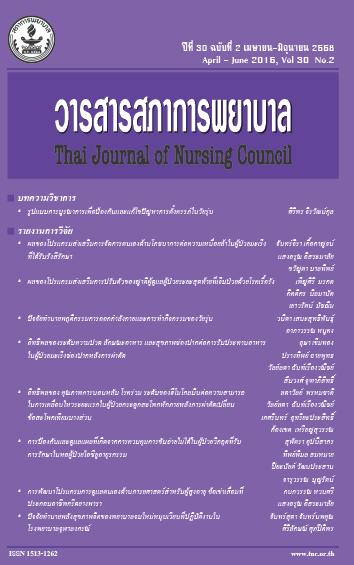ผลของโปรแกรมส่งเสริมการปรับตัวของญาติผู้ดูแลผู้ป่วยระยะสุดท้ายที่เจ็บป่วยด้วยโรคเรื้อรัง
Keywords:
คำสำคัญ, การปรับตัว ญาติผู้ดูแล โรคเรื้อรัง ระยะสุดท้าย การพยาบาล Keywords, adaptation, adjustment, caregiving relative, chronic disease, terminal, nursing careAbstract
บทคัดย่อ: วัตถุประสงค์: เพื่อศึกษาผลของโปรแกรมส่งเสริมการปรับตัวของญาติผู้ดูแลผู้ป่วยระยะสุดท้ายที่เจ็บป่วยด้วยโรคเรื้อรัง
การออกแบบการวิจัย: การวิจัยกึ่งทดลอง แบบสองกลุ่ม วัดผลก่อนและหลังการทดลอง
วิธีดาเนินการวิจัย: กลุ่มตัวอย่างเป็นญาติผู้ดูแลผู้ป่วยระยะสุดท้ายที่เจ็บป่วยด้วยโรคเรื้อรัง การคัดเลือกแบบเฉพาะเจาะจงจำนวน 50 ราย โดย 25 รายแรกเป็นกลุ่มควบคุมที่ได้รับการพยาบาลตามปกติ และ 25 รายต่อมาเป็นกลุ่มทดลองที่เข้าร่วมโปรแกรมส่งเสริมการปรับตัว เครื่องมือที่ใช้ในการวิจัยได้แก่ 1) แบบประเมินระดับผู้ป่วยที่ได้รับการดูแลแบบประคับประคอง ฉบับภาษาไทย 2) แบบสัมภาษณ์ข้อมูลทั่วไปของญาติผู้ดูแลและผู้ป่วย 3) แบบสัมภาษณ์การปรับตัวของญาติผู้ดูแลผู้ป่วยระยะสุดท้ายที่เจ็บป่วยด้วยโรคเรื้อรัง 4) โปรแกรมส่งเสริมการปรับตัวของญาติผู้ดูแลผู้ป่วยระยะสุดท้ายที่เจ็บป่วยด้วยโรคเรื้อรัง วิเคราะห์ข้อมูลโดยใช้การแจกแจงความถี่ ค่าเฉลี่ย ค่าเบี่ยงเบนมาตรฐาน สถิติไค-สแควร์ ในการทดสอบข้อมูลทั่วไปของกลุ่มตัวอย่าง และทดสอบสมมติฐานโดยใช้สถิติที
ผลการวิจัย: 1. ญาติผู้ดูแลที่เข้าร่วมโปรแกรมส่งเสริมการปรับตัวของญาติผู้ดูแลในการดูแลผู้ป่วยระยะสุดท้ายที่เจ็บป่วยด้วยโรคเรื้อรังมีคะแนนเฉลี่ยการปรับตัวภายหลังเข้าร่วมโปรแกรมดังกล่าว สูงกว่าก่อนเข้าร่วมโปรแกรมอย่างมีนัยสำคัญทางสถิติ (p < .001)
2. ญาติผู้ดูแลที่เข้าร่วมโปรแกรมส่งเสริมการปรับตัวของญาติผู้ดูแลในการดูแลผู้ป่วยระยะสุดท้ายที่เจ็บป่วยด้วยโรคเรื้อรังมีคะแนนเฉลี่ยการปรับตัวภายหลังเข้าร่วมโปรแกรมดังกล่าว สูงกว่ากลุ่มที่ได้รับการพยาบาลตามปกติอย่างมีนัยสำคัญทางสถิติ (p < .001)
ข้อเสนอแนะ: ควรนำโปรแกรมที่สร้างขึ้นไปใช้ในการส่งเสริมการปรับตัวของญาติผู้ดูแลในการดูแลผู้ป่วยระยะสุดท้ายที่เจ็บป่วยด้วยโรคเรื้อรังเพื่อให้มีคุณภาพชีวิตที่ดีต่อไป
Abstract: Objective: To examine the extent to which an adjustment-promoting programme could help the terminal chronic disease patients’ caregiving relatives to make adjustment.
Design: Two-group quasi-experimental research, with a pre-test and a post-test.
Implementation: The subjects were 50 caregiving relatives of terminal chronic disease patients. The subjects were purposively sampled and equally divided into a control group and an experimental group. The subjects in the control group were given regular care, whilst the subjects in the experimental group were treated with an adjustment-promoting programme. The research instruments were (1) a form for assessing patients receiving palliative care (Thai edition); (2) an interview form for acquiring the general information on the patients and their caregiving relatives; (3) an interview form for gathering adjustment data from the terminal chronic disease patients’ caregiving relatives; and (4) an adjustment-promoting programme for the terminal chronic disease patients’ caregiving relatives. The data were analysed using descriptive statistics, focusing on the frequency, mean, standard deviation. The general information on the subjects was analysed using chi-square statistics. Hypothesis testing was done using an independent t-test.
Results: The study showed the following. First, the subjects treated with the programme achieved a significantly higher mean post-test adjustment scores than their pre-test scores (p < .001). Second, the subjects treated with the programme achieved a significantly higher mean post-test adjustment scores than their control-group counterparts did (p < .001).
Recommendations: It is recommended that the developed programme be used to help terminal chronic disease patients’ caregiving relatives to adjust themselves and achieve better quality of life.








